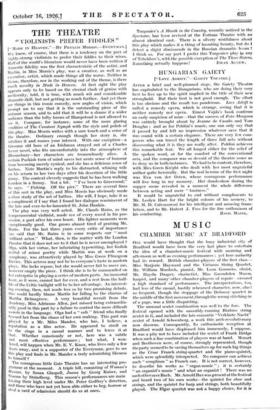THE THEATRE
" VIOLINISTS PREFER FIDDLES "
r MADE IN HEAVEN."—BY PHYLLIS MORRIS.—EVERYMAN.1 %WE knew, of course, that there is a tendency on the part of highly-strung violinists to prefer their fiddles to their wives. Half of the world's literature would never have been written if domestic fidelity was the first characteristic of the artist; and Martin, in Miss Morris's play, was a creative, as well as an executive, artist, which made things all the worse. Neither in theme, therefore, nor in the working out of the theme, is there much novelty in Made in Heaven. At first sight the play appears only to be based on the eternal clash of genius with mediocrity, told, it is true, with much wit and considerable dramatic skill, but not getting us much further. And yet there are things in this ironic comedy, new angles of vision, which prompt me to say that it is the outstanding piece of the autumn season, and to add that it will be a shame if a wider audience than the lofty brows of Hampstead is not allowed to see it. Compare, for instance, some of the more glaring crudities of The Constant Nymph with the style and polish of this play. Miss Morris writes with a sure touch and a sense of the theatre. Ordinary enough though her story is, she vitalizes it and rouses your interest. With one exception—a tiresome old bore of an Irishman strayed out of a Charles I.ever novel, who fits uncomfortably into the atmosphere of Bloomsbury—her characters are tremendously alive. A certain Puckish turn of mind saves her acute sense of humour from becoming merely cynical, and she has a delicious sense of bathos. Note Martin's reply to his distracted, whining wife on his return to her two days after his desertion of the little ninny. The context cleverly suggests that he has been walking London in a frenzy. Not a bit: " I've been to Gravesend," he says. " Fishing. Of the pier." There are several lines of this sort in the play, and Miss Morris has obviously made a close study of the art of bathos. She will, I hope, take it as a compliment if I say that I found her dialogue reminiscent of the late and ever-to-be-lamented St. John Hankin.
The play was very well acted. Mr. Claude Rains, as the temperamental violinist, made use of every mocd in his pos- session, a part after his own heart. His lighter moments were exceptionally good. One grows almost tired of praising Mr. Rains. For the last three years every critic of importance has said that Mr. Rains is in some respects our " most brilliant actor." What, then, is the matter with the London Theatre that it does not see to it that he is never unemployed ? Olga, with her virtue, her infuriating typewriting, her foolish recital of minor poetry while Martin was at work on a symphony, was attractively played by Miss Gwen Ffrangcon Davies. This actress may not be to everyone's taste in modern plays. She lacks repose, but she would never fail to move me, however empty the piece. I think she is to be commended on her enterprise in playing a series of modern parts. An immortal hour, as it were, cannot last for ever, and a rest from the half- life of the Celtic twilight will be to her advantage. An interest- ing evening, then, not made less so by two promising debuts. One could hardly blame Martin for falling to the charms of Martha Helmsgrove. A very beautiful recruit from the Academy, Miss Adrianne Allen, just missed being extraordin- arily good in this part by a failure to control the more difficult vowels in the language. Olga had a " safe " friend who finally rescued her from the chaos of her own making. This part was played by a Mr. Miles Mender, who has, I believe, a reputation as a film actor. He appeared to stroll on
to the stage in a casual manner and to leave it at that. -Whether consciously or not, here was a subtle
and most effective performance ; but what, I won- dered, will happen when Mr. E. V. Knox, who lives only a few doors away, and is a supporter of the Everyman, goes to see this play and finds in Mr. Mander a truly astonishing likeness to himself ?
The courageous little Gate Theatre has an interesting pro- gramme at the moment. &triple bill, consisting of Woman's 1151nour, by Susan Glaspell, Juana by Georg Kaiser, and Sonoon by Strindberg. This season's performances are main
tanning their high level under Mr. Peter Godfrey's direction, and those 'who have not yet been able either to beg, borrow or steal a card of admission should do so at once.
Turgeniev's A Month in the Country, recently noticed in the Spectator, hai been revived at the Fortune Theatre with an almost identical cast. There is a silvery wistfulness about this play which makes it a thing of haunting beauty, but do I detect a slight diminuendo in the Russian dramatic boom ? I think so. For my part I prefer this Turgeniev play to any of Tchekhov's, with the possible exception of The Three Sisters.






















































 Previous page
Previous page